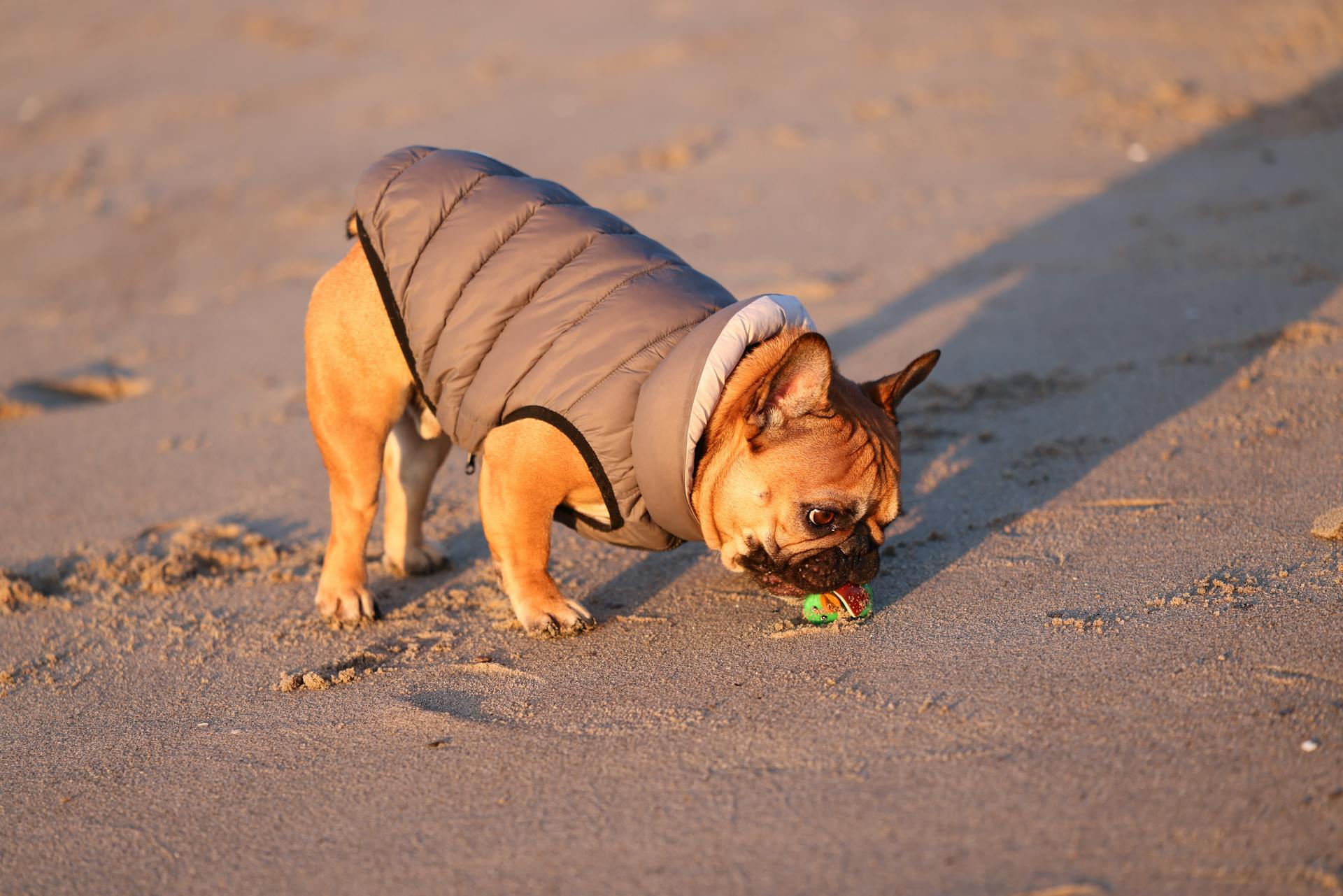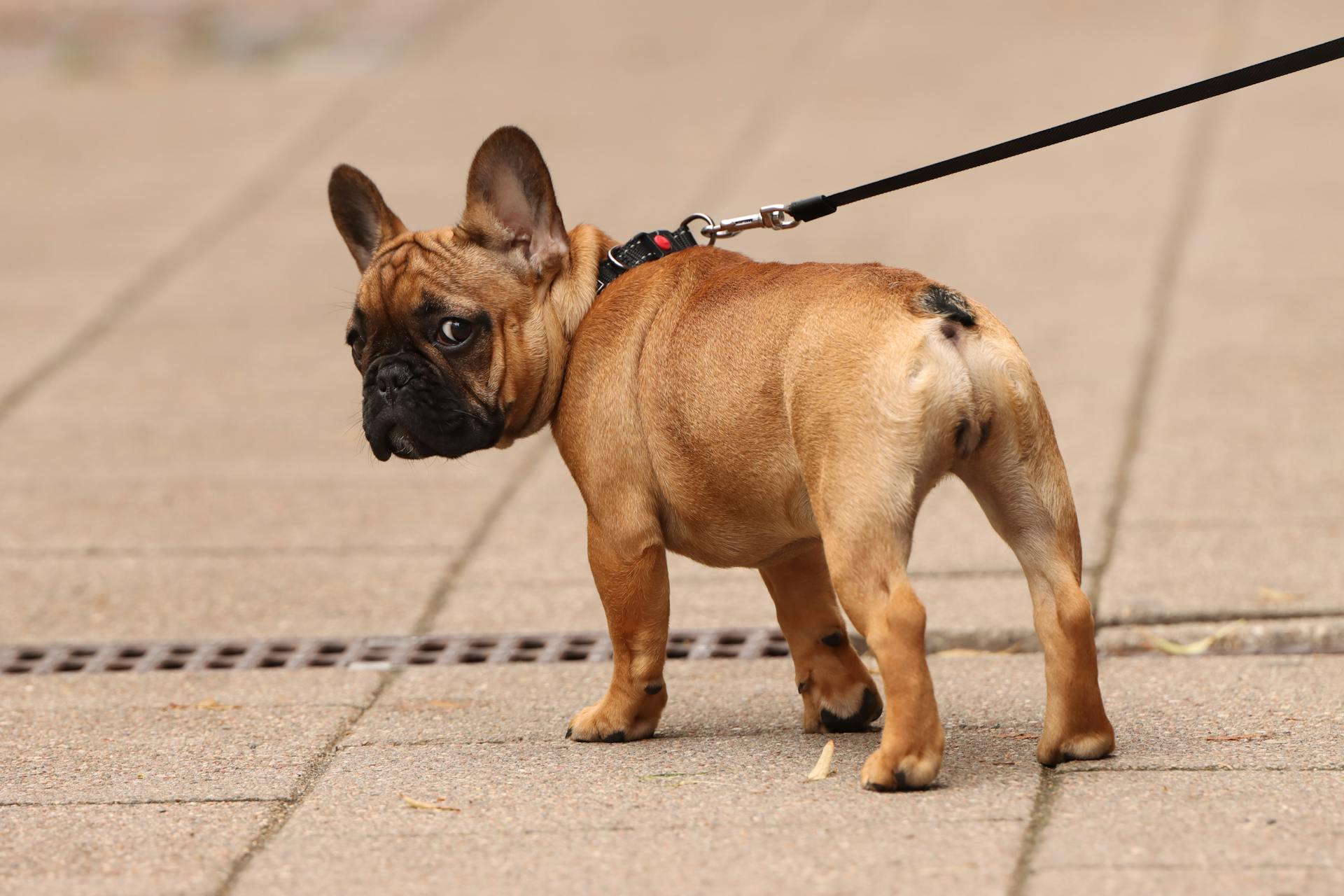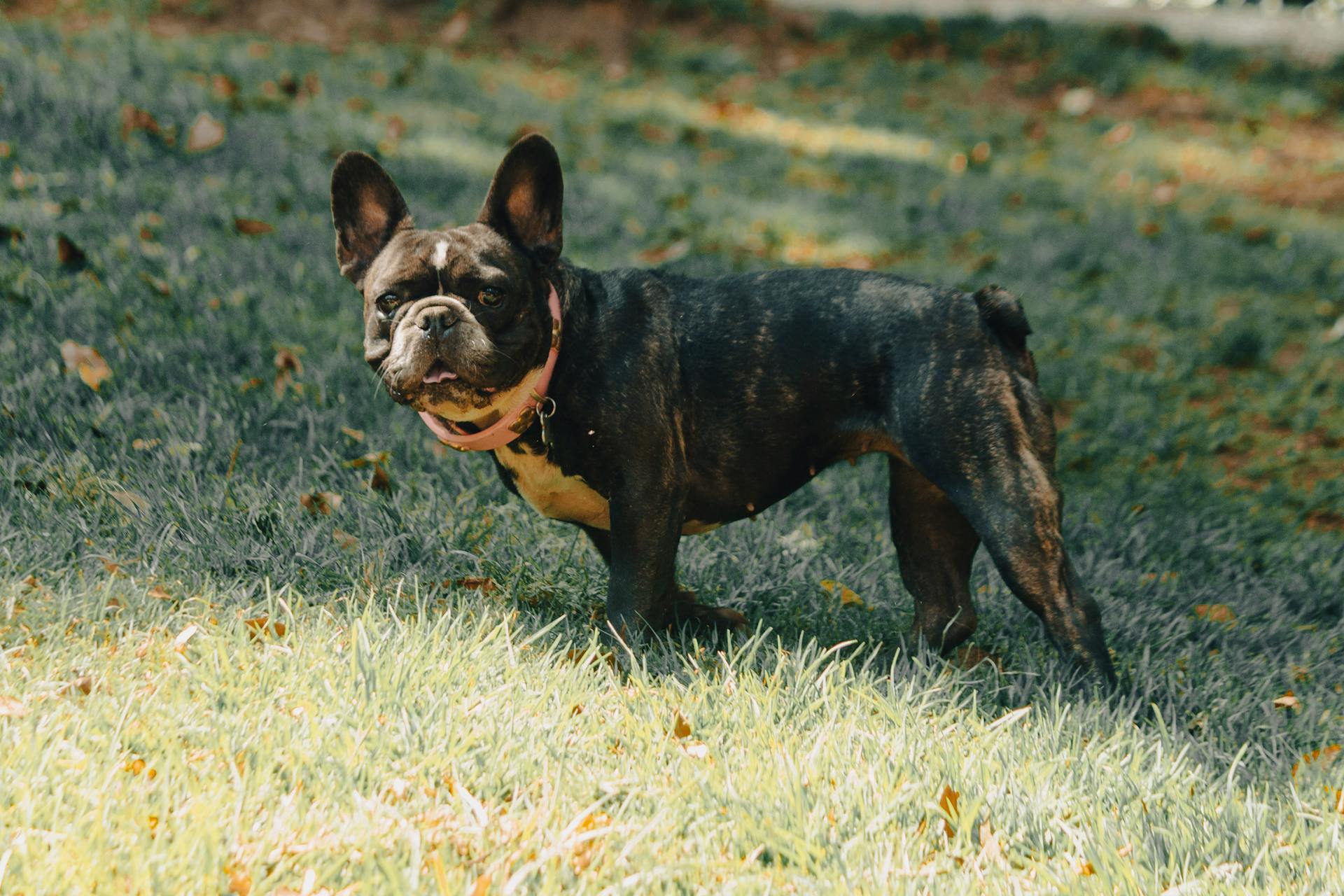
Hemivertebrae in French Bulldogs can be a serious issue, but with the right knowledge and care, you can help prevent it or manage it if your dog is already affected.
French Bulldogs are prone to hemivertebrae due to their unique skeletal structure, which can make them more susceptible to spinal deformities.
Hemivertebrae can lead to a range of problems, including back pain, difficulty breathing, and even paralysis.
French Bulldogs with hemivertebrae may exhibit signs such as difficulty walking, loss of appetite, and lethargy.
Causes and Prevention
Hemivertebrae in French Bulldogs can be caused by genetics, with a study showing that 70% of French Bulldogs with the condition have a family history of it. This is a significant concern for breeders and owners alike.
Genetic mutations can lead to hemivertebrae, and research has identified specific genetic variants associated with the condition. French Bulldogs with the condition often have a combination of genetic and environmental factors contributing to its development.
To prevent hemivertebrae in French Bulldogs, responsible breeding practices are crucial, including genetic testing and careful selection of breeding stock. Regular veterinary check-ups can also help identify potential issues early on.
Bulldog Spinal Abnormalities Prevention

Most bulldog pups show symptoms of spinal vertebral abnormalities between the ages of 3-4 months, with a sudden onset of hind limb weakness.
These symptoms often start with a gait abnormality and can worsen over time, leading to muscle wasting and loss of bladder and bowel control.
In most cases, the neurological abnormalities will plateau at age 9 months as the vertebrae stop growing.
The condition is caused by hemivertebrae, which form when the right and left halves of the developing vertebral body fail to fuse.
This results in a wedge-shaped vertebral body, which can cause a dorsal (top) curvature (kyphosis) or a lateral (side) curvature (scoliosis).
The vertebrae most often involved are the 9th – 11th thoracic vertebrae, and most times, only a single vertebra is involved, showing no clinical problems.
If more than one vertebra is involved, the probability of clinical problems increases due to the greater degree of curvature.
Here are the common symptoms to watch out for:
- Pain and/or loss of sensation due to the interruption of sensory circuits
- Weakness or paralysis, especially of the hind limbs, if motor nerve circuits are affected
Spinal Abnormalities in Bulldogs: TIP & WARNINGS

Symptoms of spinal abnormalities in bulldogs can start as early as 3-4 months, with a sudden onset of hind limb weakness.
Most bulldog pups who show symptoms will experience worsening hind limb paralysis, muscle wasting, and loss of bladder and bowel control over time.
Fortunately, these neurological abnormalities will often plateau at around 9 months of age, as the vertebrae stop growing.
A single wedge-shaped or butterfly-shaped vertebra is rarely a cause for concern, and in most cases, won't cause problems.
Bulldogs with a single wedge or butterfly-shaped vertebra are very common, especially in Frenchies.
In bulldogs, a butterfly-shaped type of spinal abnormality is common, and can often be identified by a gait abnormality before symptoms worsen.
Bulldog owners should be aware that hind limb paralysis can be a sign of spinal abnormalities, and veterinary care should be sought if symptoms arise.
On a similar theme: How Often Should French Bulldogs Eat
Diagnosis and Treatment
A simple spinal x-ray will be able to definitively tell if your French Bulldog has hemivertebrae.

If your dog is not experiencing symptoms of spinal compression, it will not need any particular treatment, but you should be cautious of allowing your dog to overly stress its spine, as it will be more likely to have a spinal injury.
The vet may recommend a surgical procedure called a hemilaminectomy if your dog shows signs of weakness in their back legs or incontinence.
Suggestion: Dog Food for French Bulldogs with Allergies
Bulldog Vertebral Abnormalities Testing
Special imaging tests like myelography, MRI, or CT imaging are commonly used to detect spinal cord compression caused by hemivertebrae in bulldogs.
These imaging tests can help identify if the spinal cord is being compressed, which can lead to serious health issues.
Dr. Kraemer notes that these tests are a crucial part of diagnosing spinal vertebral abnormalities in bulldogs.
The goal of these tests is to get a clear picture of the bulldog's spinal cord and vertebrae to determine the best course of treatment.
By identifying the extent of the compression, veterinarians can develop a treatment plan to alleviate the bulldog's symptoms and improve its quality of life.
Diagnosis and Treatment

Diagnosis is a crucial step in determining the best course of action for your pup. A simple spinal x-ray will be able to definitively tell if your pup has hemivertebrae.
To confirm the diagnosis and assess the extent of the condition, spinal imaging is necessary. This will help determine where the spine is compressed and how badly impacted the spinal column is.
If your dog is not experiencing symptoms of spinal compression, no particular treatment is needed. However, you should be cautious of allowing your dog to overly stress its spine as it will be more likely to have a spinal injury.
In cases where your dog shows signs of weakness in their back legs or incontinence, a surgical procedure called a hemilaminectomy may be recommended. This involves removing the material of the disc that is pressing against the spinal cord and stabilizing the spine.
Crate rest and anti-inflammatories may be recommended for minor symptoms, as these can help alleviate discomfort and promote healing.
Take a look at this: National Dog Show 2023 French Bulldog
Symptoms and Impact

Most likely, your French Bulldog will not be paralyzed due to hemivertebrae, as the vertebral malformation usually occurs in the dog's tail and does not affect the spinal cord.
However, in some cases, your dog may become symptomatic, and in those instances, hemilaminectomy surgery can help your dog regain the ability to walk.
The symptoms of hemivertebrae in French Bulldogs can be quite subtle, and owners may not even notice anything out of the ordinary at first.
Suggestion: National Dog Show French Bulldog
French Bulldog Hemivertebrae
French Bulldogs are prone to a condition called hemivertebrae, where one or more of their vertebrae is malformed. This usually occurs in the tail area.
Hemivertebrae in French Bulldogs is often a common occurrence, with both the wedge-shaped and butterfly-shaped types being very common. However, when only a single one is present, it very rarely causes problems.
In most cases, having hemivertebrae doesn't mean your French Bulldog will be paralyzed. The vertebral malformation usually doesn't affect the spinal cord.
In rare cases, if your dog becomes symptomatic, the hemilaminectomy surgery can help your dog regain the ability to walk.
Research and Findings

Hemivertebrae in French Bulldogs have been studied extensively, and the results are quite telling. The degree of spinal curvature is significantly associated with the type of hemivertebra.
The most common type of hemivertebra, VH subtype, is particularly concerning as it's associated with higher Cobb angles and a higher likelihood of kyphosis. This means that French Bulldogs with VH subtype hemivertebrae are more likely to develop a curvature of the spine.
Interestingly, the breed itself also plays a role in the likelihood of kyphosis. Pugs with hemivertebrae are more likely to develop kyphosis than French Bulldogs or English Bulldogs. In fact, Pugs have a significantly higher likelihood of kyphosis compared to these other breeds.
Kyphosis is a serious condition that can lead to significant health issues if left untreated. Understanding the risks associated with hemivertebrae in French Bulldogs is crucial for pet owners and breeders alike.
Here's a brief summary of the breeds and their likelihood of kyphosis:
It's essential to be aware of these findings and take steps to monitor your French Bulldog's health, especially if they have a history of hemivertebrae. Regular check-ups with a veterinarian can help identify any potential issues early on.
Conclusion

Acupuncture combined with Chinese herbs is a good treatment choice for caudal paralysis due to mild congenital hemivertebra in French bulldogs.
TCVM is especially useful for neurological emergencies in hemivertebral young French bulldogs when deep pain exists.
Unfortunately, TCVM did not eliminate urinary incontinence.
Frequently Asked Questions
Can dogs live with hemivertebrae?
Dogs can live normal lives with close monitoring, but treatment may be necessary for more severe cases
How much does hemivertebrae surgery cost for dogs?
Surgery for hemivertebrae in dogs can cost between $1,500 to $4,000, depending on the location and severity of the condition
Is hemivertebrae serious?
Hemivertebrae can cause significant spine deformities, and the severity of the condition depends on various factors. Understanding the specifics of your case is crucial to determining the best course of action and treatment options.
Sources
- https://www.ncbi.nlm.nih.gov/pmc/articles/PMC5067848/
- https://www.walkinpets.com/blog/hemivertebrae-in-dogs/
- https://pubmed.ncbi.nlm.nih.gov/28283076/
- https://avmajournals.avma.org/view/journals/ajvr/80/2/ajvr.80.2.189.xml
- https://vet4bulldog.com/prevents-treat/spinal-vertebral-abnormalities-in-bulldogs-butterfly/
Featured Images: pexels.com


